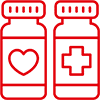What is a clinical trial?
Clinical trials are research studies designed to observe the effects of a new medical intervention on human health outcomes. The aim of clinical trials is to develop new medicines that help people live healthier and more comfortable lives. To achieve this, researchers develop medications to improve the detection, treatment, management and prevention of various medical conditions or diseases.
Medication testing takes place in clinical trials. During a clinical trial, researchers find out whether an investigational medication is effective in treating the disease and well tolerated. Clinical trials might also compare or combine existing interventions, or evaluate how people respond to other health-related factors.
Types of clinical trials
Where do clinical trials take place?
Clinical trials usually take place in medical clinics and/or hospitals.
Who is involved in clinical trials?
During a clinical trial, you will be supported by a dedicated team of researchers, coordinators, doctors and nurses. Each member of the study team is committed to your health and well-being. At each phase of medication development, government agencies check the results to see whether the medication can continue to the next phase.
What can I expect at the study centre?
During visits to the study centre, you will undergo tests and assessments. The purpose of these tests is to understand how your body is responding to the investigational trial medication. You may have the following tests and assessments at some point in the trial:
What is informed consent?
Before entering a clinical trial, informed consent must be given. This is in the form of a Participant Information and Consent Form (PICF), which is a document that explains the purpose and specifics of the trial, what participants will be required to do and how they will be involved. This document is for participants to read, understand and keep. A copy must be signed before commencing. You can request the study team to go through the document with you if there is anything that you do not understand. At the end of the day, we are here to support you, the patients.
How do I know if a trial is the right fit for me?
There are certain criteria that need to be met before someone is eligible to participate in a clinical trial. These include age, signs and symptoms of a condition, medical treatment, lifestyle as well as time and accessibility to where the trial is being held. It is important to carefully assess if you match the criteria and that you understand any potential risks involved. There is no guarantee that you will benefit from taking part in a clinical trial. And remember, clinical trials are voluntary. You are free to leave at any time and for any reason, with no penalty to you.














